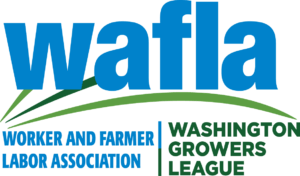Western Innovator: Wafla leader advocates for farmers, workers
Western Innovator: Wafla leader advocates for farmers, workers
By Don Jenkins, Capital Press
May 9, 2024
LACEY, Wash. — Walfa CEO Enrique Gastelum worked on a farm as a youth near Sunnyside, Wash., and his father, a farmworker, asked him if he too wanted to be a farmworker.
"I said, 'Hell, no, it's hard work,'" Gastelum recalled. "I never thought I'd work in agriculture."
Yet Gastelum, 46, now leads one of the country's largest suppliers of foreign farmworkers. Formerly the Washington Farm Labor Association, Wafla helps farms obtain seasonal employees, mostly from Mexico.
The H-2A visa program gets attacked, sometimes viciously, as exploitative. It does not sit well with Gastelum.
The H-2A program relieves an acute labor shortage for farmers and provides workers with a safe and legal way to make money without having to permanently uproot their families, Gastelum said.
"My attitude is I can be an advocate for farmers and farmworkers at the same time," he said.
Plans change
Gastelum's late mother, Nelda, was a "bracero baby," born in Texas to farmworkers. His father, Enrique Sr., came from Mexico to the U.S. as a teen. They met in the Yakima Valley, where Enrique Jr. was born and raised.
Nelda had a 30-year career with the state. She was a fraud investigator with the Department of Labor and Industries and helped start a unit to help Spanish speakers file workers compensation claims.
She had been a farmworker and became a farmworker advocate and came to see that farmers were sometimes overwhelmed by the rules they had to follow, Gastelum said.
"I try to take a balanced approach, and I give a lot of credit to listening to how she approached things," he said.
Enrique Sr. retired as a farmworker and died in 2022. His son, who grew up as "Rick," started going by Enrique to honor his father and Mexican-American heritage.
"I think of my parents often," Gastelum said. "They wanted something more for us."
Changes direction
Gastelum went to Washington State University on an academic scholarship intent on becoming a doctor. He prepared for medical school by earning a degree in zoology.
Then he realized he didn't want to be a doctor. "It hit me one day, 'I'm not supposed to be doing this.'"
He worked packing fruit and then went to work for Labor and Industries. He was in enforcement, looking for violations, and then was a safety consultant, helping avoid violations. He preferred the latter, he said.
The state job led to a safety director position with the Washington Farm Bureau. He earned a master's degree in public administration at the University of Phoenix and became Farm Bureau's chief financial officer in 2013.
Gastelum moved in 2022 to Wafla, taking over an organization founded and built by Dan Fazio. Wafla was the fourth-largest H-2A employer in the U.S. in 2023, according to the U.S. Department of Labor.
Job numbers down
The H-2A program has exploded in the past 20 years. The number of H-2A jobs grew by more than 600% between 2005 and 2023 nationally, according to the Labor Department. The growth was about triple that, more than 1,800%, in Washington.
The Washington Employment Security Department has tried to find more domestic workers to fill farm jobs that would otherwise go to foreign workers. It found 11 in 2022 and zero in 2021.
"If the general public knew more about the data, they'd say (H-2A workers) are not stealing U.S. workers jobs," Gastelum said.
So far this year, the U.S. Labor Department has certified 20,261 Washington farm jobs are available for H-2A workers. That's 2,300 fewer than this time last year.
Gastelum predicts the trend will hold up. Washington won't approach the record 35,680 H-2A jobs it had in 2023, he said.
"Washington numbers are going to definitely be less than last year," Gastelum said. "We could be talking 31, 32 (thousand) at the end of the year."
Washington hasn't seen a year-over-year decline in H-2A workers since the Labor Department started keeping state-level records. There could be several reasons for it, Gastelum said.
An oversupply of apples, grapes and hops may cause farmers to cut back and to need fewer workers. Also, foreign labor continues to be more expensive to pay and house, pricing farms out of the program, he said.
More H-2A rules
Another reason could be the layers of regulation. The Biden administration has issued three major H-2A rules. The latest, published in April, will prevent farmworkers from being abused, according to the administration.
The rule opens farms to union organizers, a requirement the Supreme Court ruled unconstitutional, and will force farm supervisors to send their date of birth, address, phone number and email to the Labor Department.
It backed off on a proposal to require farms to provide unions with contact information for H-2A workers, including cell phone numbers and profile names for "any messaging application the worker uses."
"I would bet if his (Biden's) administration gets another term, we'll get more rules and they'll keep working at that unionization piece," Gastelum said.
Gastelum said farmworkers can be vulnerable to abuse. He also doesn't dispute there are bad agricultural employers. "We'd be fooling ourself if we said there weren't," he said.
But a small percentage of farms are responsible for a large percentage of the violations, said Gastelum, who disputes the contention that H-2A workers have no recourse to report abuse or contract violations.
"That's what I disagree with — that H-2A workers don't know who to talk to," he said. "There are tons of mechanisms for farmworkers to speak up."
